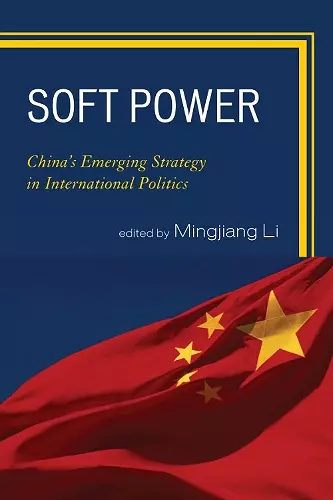Soft Power
China's Emerging Strategy in International Politics
Format:Paperback
Publisher:Lexington Books
Published:7th Feb '11
Currently unavailable, and unfortunately no date known when it will be back
This paperback is available in another edition too:
- Hardback£102.00(9780739133774)

Soft power has become a very popular concept in international affairs, appearing in government policy papers, academic discussions, and the popular media. In China, soft power has become one of the most frequently used phrases among political leaders, leading academics, and journalists. Defined against hard power, which often involves threat and coercion, soft power applies attraction, persuasion, and cooperation, finding its sources in culture, political values, and foreign policies. China, rich in culture and traditional philosophy, boasts abundant sources of soft power. Soft Power attempts to analyze the domestic and international views of China's soft power, the main strengths and weaknesses of China's soft power, and the application of soft power in China's international politics. It provides a comprehensive exploration of the soft power dimension in China's foreign relations by integrating views from various disciplines, such as history, education, culture, political economy, comparative politics, and philosophy. The book argues that soft power has become a very popular concept in China, that China is contemplating and exploring an innovative strategy in its rise and international politics, and that there have been quite a few notable elements of this in China's diplomatic practice, including softer rhetoric, promotion of the Chinese culture abroad, economic diplomacy, and image building. The book also argues that the limitations of China's soft power primarily stem from political values and China's own transitions, and reflects the reality that views and opinions regarding China's soft power are fairly diverse both in China and in the international arena.
Looking critically and carefully at the concept 'soft power,' this book pulls together the views of leading scholars to show the ways in which China can—and cannot—exercise soft power as it rises in Asia and the world. This is a really smart take on a complicated topic. Highly recommended. -- Joseph Fewsmith, Boston University
Soft Power takes on one of the most important questions of this century: What is China’s rightful place in the international system? This edited volume brings together essays by highly knowledgeable scholars, addressing key issues of China’s emerging soft power. The contributors identify sources and constraints of China’s soft power, while showing how China has perceived its soft power and how China’s soft power has been perceived by other powers in Asia. It provides a unique angle to look into China’s rise and its consequences. -- Zheng Yongnian, director, East Asian Institute, National University of Singapore, director, East Asian Institute, National University of Singapore
This is the first systematic and scholarly evaluation of China's soft power—it is an informed and nuanced corrective to previous sensationalistic journalistic assessments. It is recommended reading for all interested in this important dimension of China's rise in world affairs. -- David Shambaugh, The George Washington University and The Brookings Institution
At a conference in Singapore held in October 2007, several academics debated the rise of China. From these conference proceedings, Mingjiang Li edited a volume on Chinese soft power based on Joseph Nye’s theory introduced in 1990. According to Nye, soft power is a strategy for a country to gain its objectives without coercion or payments, but with attraction founded on culture, political values, and legitimate and moral foreign policy. * Journal of Chinese Political Science *
ISBN: 9780739133781
Dimensions: 231mm x 156mm x 18mm
Weight: 438g
284 pages